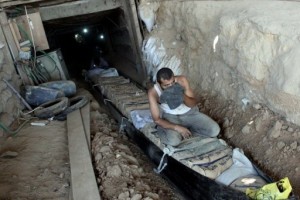
RAFAH, Palestinian Territories — (AFP) Egypt’s closure of scores of cross-border smuggling tunnels has affected the flow of goods into Gaza but has not dealt the knockout blow widely expected by traders and officials.
Following an attack which killed 16 Egyptian border police in the Sinai on August 5, Cairo moved swiftly to block off or destroy many of the tunnels on suspicion that some of the assailants had used them to sneak in from the Hamas-run Gaza Strip.
The move sparked panic in Gaza with many fearing it would cut off a vital lifeline which brings in food, clothes, building materials and fuel into the impoverished Palestinian territory subjected to an Israeli blockade since 2006.
Last week, the Egyptian military said its troops had destroyed 31 of the 225 main tunnels running under the border, although security sources in Cairo had earlier told AFP they had blocked or destroyed at least 120 of them.
But initial fears that the closure would have a devastating impact on the territory have so far proven unfounded, with economy minister Alaa al-Rafati saying it had only “partially affected the economy.”
“So far, we haven’t had any shortages,” he told AFP, saying Gaza’s dependency on the tunnels was far less than it was in the past when both the Rafah border and the Israeli-run Kerem Shalom crossing were closed.
“When the crossings were closed, we depended fully on tunnels, but now we have a 50-percent dependency on them, particularly for building materials because the Israeli side still bars them from entering Gaza,” he said.
Cairo’s crackdown on the smuggling network has affected the tunnels trade in different ways, with Abu Anas who owns a fuel tunnel telling AFP his business was only temporarily affected by the closure.
“We were affected but not severely,” he said. “Fuel wasn’t affected much because it is smuggled through underground hoses but other tunnels, which are used for building materials or travellers, were affected.”
But the involvement of Egyptian security forces meant that fewer than half of his employees were able to work, he said.
“Less than 50 percent of the workers are working now because of this harassment,” he said.
For Abu Mohammad, who runs a tunnel specialising in building materials such as gravel, steel and cement, the impact of the Egyptian clampdown has been much tougher.
“Of course we have been affected. The Egyptians have banned gravel from reaching the tunnels and closed many tunnels for building materials,” he said.
Like many other passageways specialising in building materials, his tunnel was bulldozed by the Egyptians in a move which he says has more than doubled the price of gravel in Gaza.
“A tonne of gravel used to cost 60 shekels ($15/12 euros) but now it is 150 shekels ($38/29 euros),” he said.
Rafati said the Gaza government was aware of the problem with construction materials, but said the market had “enough building materials for two or three months.”
The minister also pledged to crack down on any merchants who tried to take advantage of the shortages by hiking prices.
For other tunnels owners, the Egyptian crackdown has had a huge impact on their livelihood.
“Most of the tunnels which specialised in gravel were destroyed. And other tunnels that specialise in different merchandise are having difficulties operating because the Egyptian army and intelligence are there,” a smuggler called Abu Jihad told AFP.
“We are facing daily harassment from intelligence and now the Egyptians are talking about passing a law against tunnel owners which could see them getting 25 years in prison,” said Abu Jihad, who used to run a team of around 50 workers.
“Everyone is afraid.”
So far, three out of the four tunnels he used to operate have been destroyed by the Egyptians.
“We have been severely affected. We now work one day a week and bring through clothes, backpacks for school, computers and some electric appliances like washing machines and televisions,” he said.
“They destroyed three of my tunnels and God only knows what they’ll do next.”
Omar Shaaban, an economist who heads PALThink, a Gaza-based think-tank, says the measures were necessary for Cairo to show the Egyptian people it was trying to crack down on those behind the August attack.
“Egypt just wants to calm public opinion which says the tunnels were responsible for what happened in Sinai. But the investigation will prove that tunnels had absolutely nothing to do with the attack,” he told AFP.
“The tunnel business is illegal and it is smuggling, but people wouldn’t do it if there was an alternative,” he shrugged.
“People want to live.”